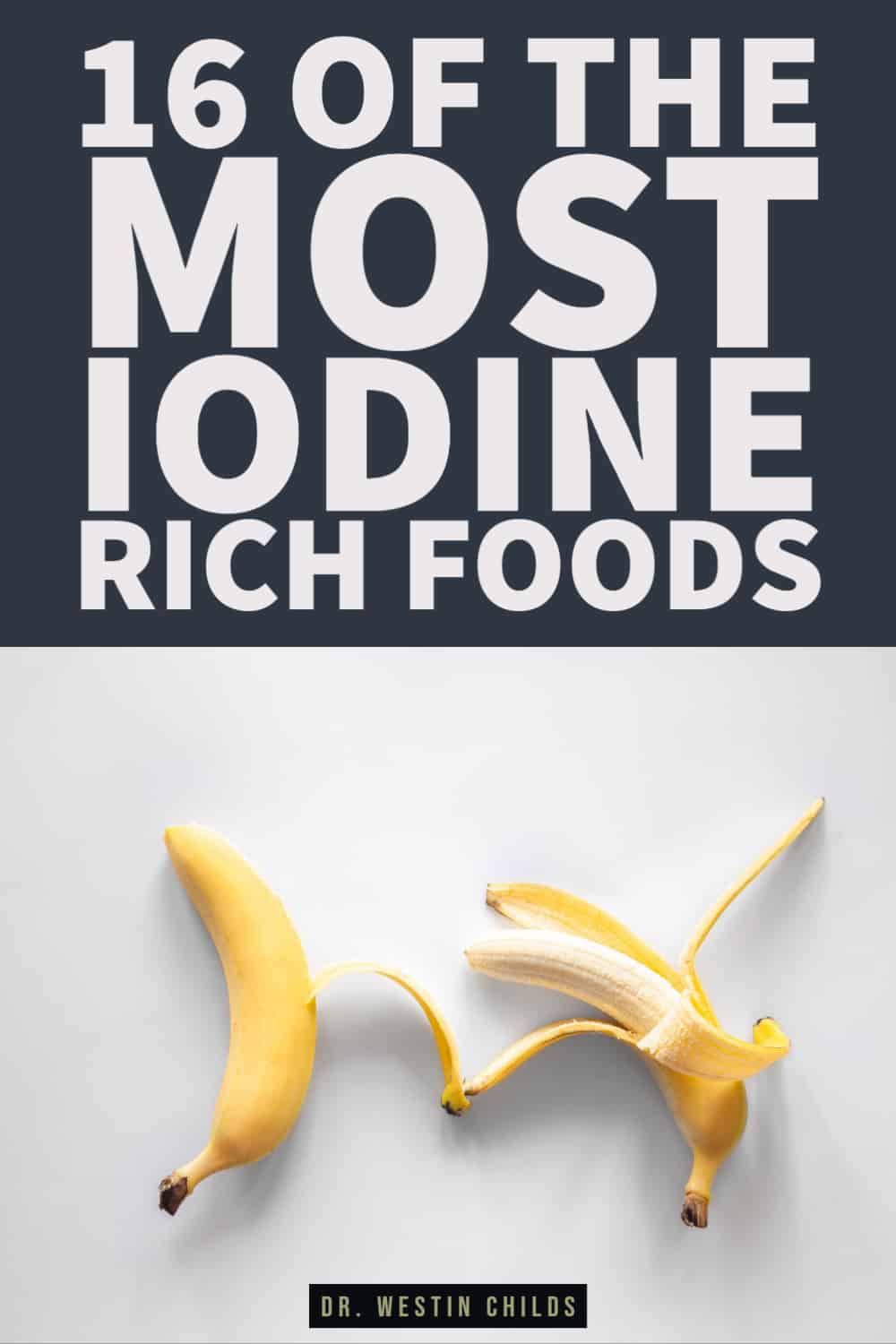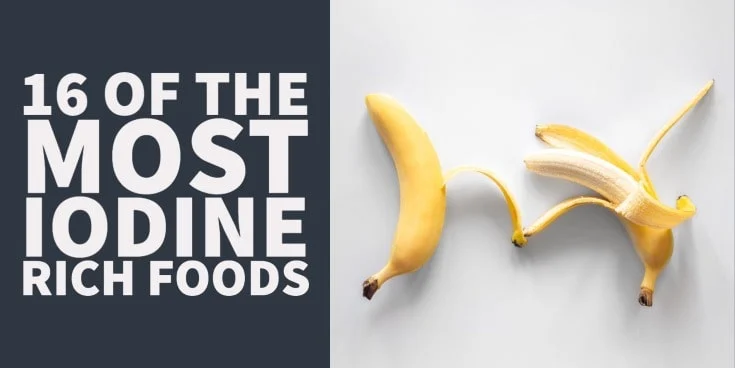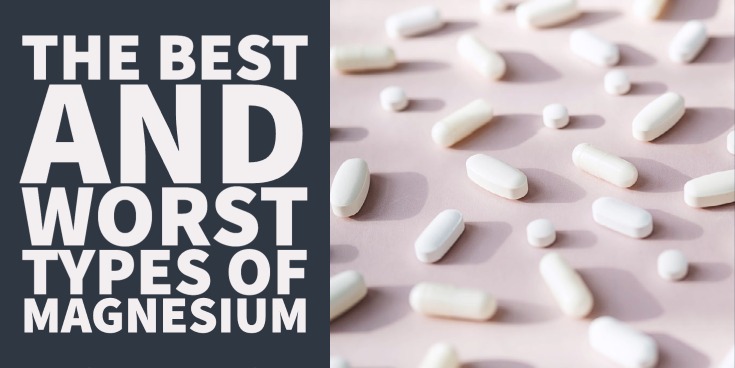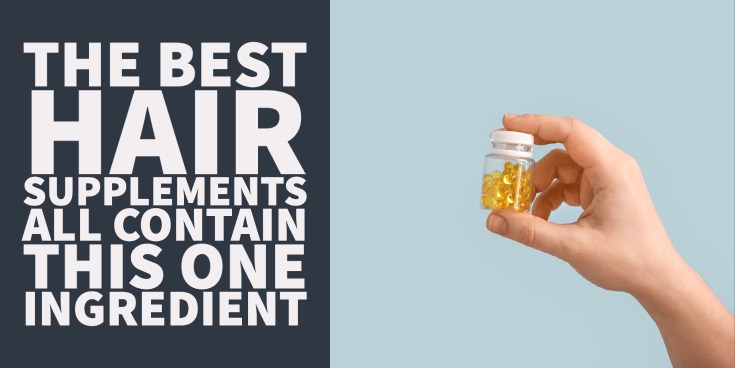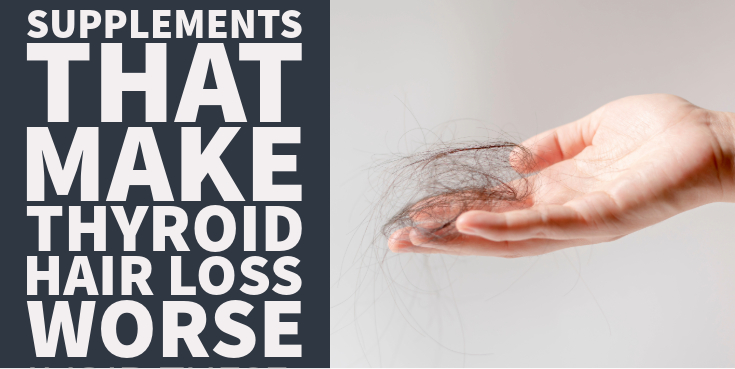Iodine is actually fairly controversial as far as minerals go.
On one hand, you have a group of people who will tell you that iodine is dangerous and should never be used for your thyroid, and on the other, you have a group of people who want you to consume incredibly high amounts of iodine each day.
But which side is right?
Well… both sides have some points but the truth lies somewhere in the middle.
But let’s get this straight:
Humans REQUIRE iodine for optimal function (1) and they CAN NOT create it on their own.
If you do not have enough iodine in your diet you will feel it in a very real way.
And that real way will come from depressed thyroid function.
If you are new to the thyroid game and what it does for your body then I would recommend checking out this article.
But suffice it to say that your thyroid is probably one of the most important hormone-secreting glands in the entire body.
Just because iodine is essential and necessary doesn’t mean that you can or should consume it willy-nilly.
There is such a thing as too much. Just because your body needs iodine to survive doesn’t mean you should consume insanely high doses each and every day.
We will go into more detail about how much iodine you should be consuming later in this article but for now, let’s talk about NATURAL sources of iodine.
And I am of course talking about food:
DOWNLOAD FREE RESOURCES
Foods to Avoid if you Have Thyroid Problems:
I’ve found that these 10 foods cause the most problems for thyroid patients. Learn which foods you should avoid if you have thyroid disease of any type.
The Complete List of Thyroid Lab tests:
The list includes optimal ranges, normal ranges, and the complete list of tests you need to diagnose and manage thyroid disease correctly!
16 Foods High in Iodine
Because the human body cannot create iodine on its own it MUST get iodine from other sources.
The most natural way to get iodine is by consuming foods that are naturally high in iodine.
Natural sources of iodine are found all over but it tends to be most concentrated in certain areas of the ocean (2).
So if you are consuming a food that comes from the ocean or spent some of its life there (such as fish or seaweed) then there’s a good chance that that food has a high iodine content.
But there are other foods on the list that may surprise you.
Below you will find a list of foods with rich iodine content. You will see that the dose of iodine found in each food varies fairly dramatically depending on the type of food, how it was processed, how big the portion is, and so on.
It can be difficult to know exactly how much iodine you are consuming with each food group but the information below should act as a pretty good guide.
To put the amount of iodine into perspective please see the section below which talks about dosing and how much iodine your body actually needs day to day.
#1. Seaweed (1 gram contains between 16 and 1984mcg of iodine)
Seaweed is probably the single best source of naturally occurring iodine.
And when it comes to different types of seaweed, you will get more bang for your buck by consuming dried seaweed (which is more concentrated).
The concentration of iodine in seaweed can vary wildly, though, which makes the exact dose you are getting with each serving unknown.
This isn’t necessarily a bad thing if you eat it sparingly, but if you have certain types of thyroid problems (more on that below) it can be a problem.
#2. Milk (one cup = 94 mcg of iodine)
Milk is a great source of iodine but the problem here is that MANY people suffer from intolerance to dairy proteins and sugars.
Lactose intolerance stems from an intolerance to milk sugar which as many as 70% of adults may acquire at some point in their lives.

In addition, many people are also intolerant to the milk proteins such as casein.
If you have thyroid problems, especially Hashimoto’s, then you may want to avoid dairy for this reason.
#3. Organ Meats (2.5 ounce = 32 mcg of iodine)
Organ meats have a surprisingly high amount of iodine in each serving but may not be appetizing to everyone.
If you can handle consuming organ meats then you will also get the benefit of other vitamins and minerals in highly concentrated doses.
#4. Cod (a 3oz serving = 99mcg of iodine)
Cod is probably my favorite way to get iodine.
It’s a light healthy fish that contains healthy omega 3’s as well as high protein content.
#5. Iodized Salt (1.5 gram = 71 mcg of iodine)
This is very important!
Not all salts are iodized which means that not all salts contain iodine.
In fact, most of the ‘professional’ or ‘healthy’ salts that people use do NOT contain iodine.
And by ‘healthy’ salts I am referring to Himalayan pink salt and Celtic sea salt.
These salts can contain additional minerals but they typically do not contain extra iodine.
You should be aware of that if you are trying to calculate your daily dose of iodine!
Check to see if your salt is “iodized”. If it doesn’t say that it is then it does NOT contain iodine.
#6. Shrimp (3 oz = 35 mcg of iodine)
#7. Tuna (3 oz = 17 mcg of iodine)
Tuna is packed with protein, and healthy omega-3 fatty acids, and is a great source of iodine.
The only problem with tuna is that it can contain higher concentrations of mercury compared to other fish.
#8. Eggs (1 large egg = 24 mcg of iodine)
Most of the iodine found in eggs comes from the yolk.
If you are eating egg whites then you are probably not getting iodine or these other beneficial ingredients.
#9. Turkey Breast (2.5 ounces = 30 mcg of iodine)
#10. Dried Prunes (5 prunes = 13 mcg of iodine)
#11. Lima Beans (1/2 cup = 8 mcg of iodine)
#12. Fish Sticks (2 fish sticks = 54 mcg of iodine)
While fish sticks do contain a relatively high dose of iodine they aren’t necessarily a great food to consume because they are often fried.
Fried foods, especially when fried in vegetable oils, can cause inflammation in the body and lead to chronic health problems.
If you do decide to eat fish sticks look for fish sticks that are fried in healthy oils such as extra virgin olive oil or coconut oil.
#13. Yogurt (1 cup = 74 mcg of iodine)
If you opt to eat yogurt then choose plain Greek yogurt.
Plain Greek yogurt is healthier than other types of yogurts and often contains much less sugar.
#14. Bananas (1 medium banana = 3 mcg of iodine)
While bananas do provide your body with some iodine the amount in each banana is very minimal.
If you wanted to get your daily dose of iodine from just bananas you’d have to eat some 50 to 100 bananas each and every day.
#15. Strawberries (1 cup = 13 mcg of iodine)
The same is true of strawberries. They are incredibly healthy but just don’t contain much iodine compared to other sources.
#16. Canned Corn (1/2 cup = 14 mcg of iodine)
How Much Iodine is Enough?
Now that you know which foods provide your body with iodine we need to take a little bit of time to talk about how much iodine you should be consuming each day.
This will put the concentration of iodine into perspective.
And when we talk about daily iodine intake we need to talk about the RDA.
The RDA is the daily recommended amount of any given nutrient provided by the Food and Nutrition Board.
While the RDA is helpful as a guide, it’s important to understand that it’s not a perfect recommendation nor is it something that you should live or die by.
The RDA doesn’t account for individual variability in terms of nutrient requirement nor does it account for declining nutrient concentration in foods due to modern farming techniques.
These two big issues make it so the RDA is inadequate for a large number of the population.
The RDA for iodine in healthy adults is around 150mcg (3).
That means you will need to consume 150mcg of iodine each and every day to provide your body (and thyroid) with enough.
Put into perspective, to get this dose you would need to eat…
- 1-3 grams of seaweed each day OR
- 1.5 cups of milk each day OR
- 12.5 ounces of organ meat each day OR
- 4.5 ounces of cod each day OR
- 3 grams of iodized salt each day OR
- 15 ounces of shrimp each day OR
- 27 ounces of tuna each day OR
- 6 large eggs each day OR
- 50 bananas each day OR
- 11.5 cups of strawberries each day
But these recommendations only account for healthy adult men and women.
The recommended iodine dose is much higher if you are pregnant or lactating.
If you are currently pregnant or breastfeeding then your iodine requirement shoots up to between 220 and 290 mcg each day.
This is almost double what your body needs on the high end (290mcg pregnant vs 150mcg non-pregnant).
And remember, this is just the RDA which is NOT a perfect guide.
I find that most people, especially women, need more iodine than this recommended amount.
I find the best results when having people supplement with around 300-400mcg each day.
Don’t be scared to go over the RDA because your body can store and hold a significant amount of iodine (4).
Your body can draw from this storage as necessary if you do not consume enough on any given day.
Do You Need To Supplement with Iodine?
Even though the ideal way to get iodine is through your diet, it may not be possible to do this.
Why?
Because of the sheer amount of food that you would be required to consume on a daily basis just to keep your levels normal.
But that’s not all…
You also have to account for preferences in taste, allergies or sensitivities to food, special diets, and so on.
When you add all of this together it’s actually quite difficult to reach even the low end of the RDA for some people.
And, in case you forgot, the RDA only represents the SMALLEST amount that is recommended for day-to-day needs.
It does NOT account for increasing your dietary consumption to help build up a reservoir of iodine for later use.
So how are you supposed to make up the difference?
With dietary supplements that contain iodine.
If you feel that you are consuming a diet high in iodine then it may not be necessary for you to use an iodine supplement but if you don’t think that you can OR if you are pregnant or lactating then looking at an iodine supplement is a great option.
When supplementing with iodine you should look for supplements that contain anywhere from 150 to 300mcg of iodine per serving.
You also want to make sure you are consuming a product that contains both iodide and iodine.
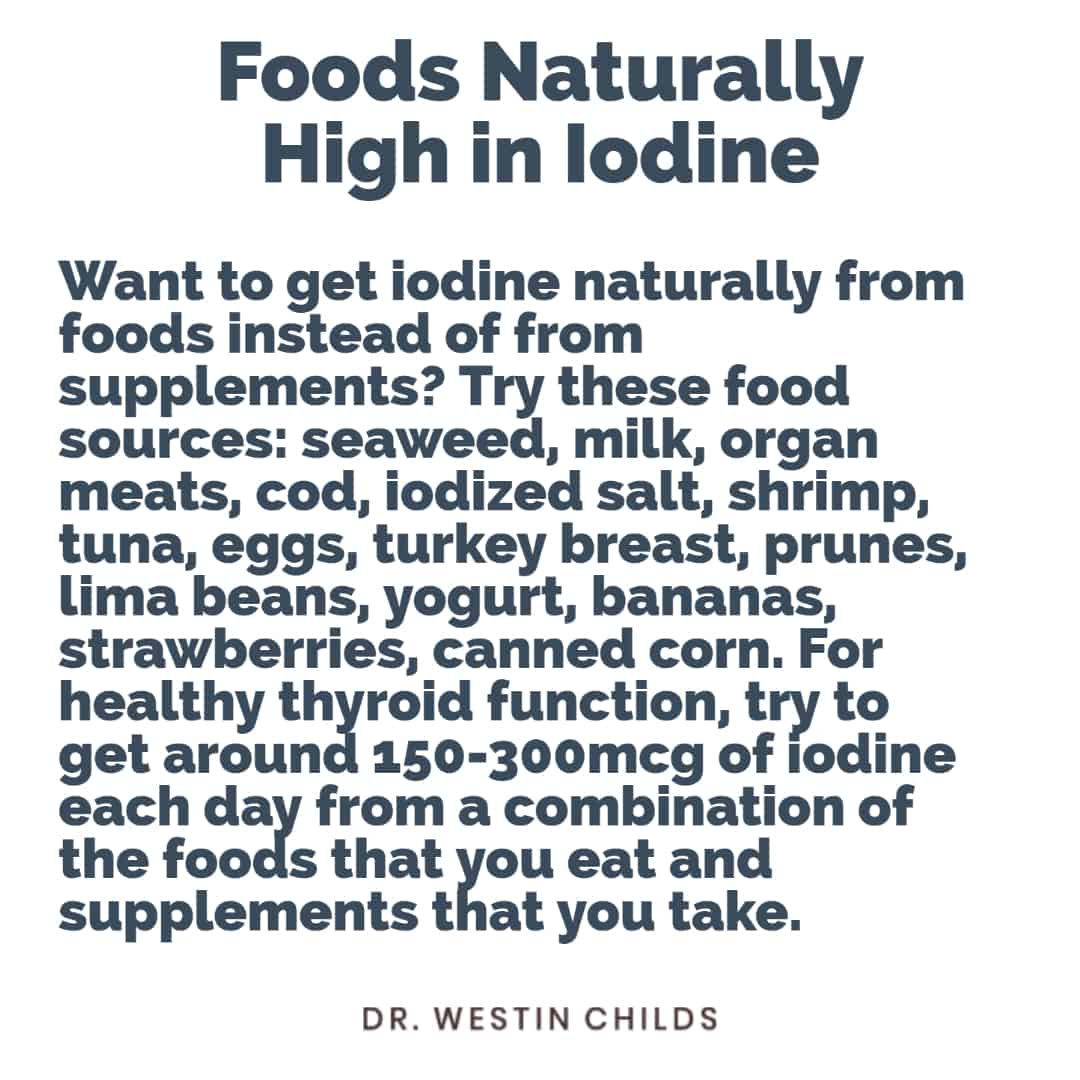
Iodine is predominately used in the thyroid gland but there are other tissues, such as breast tissue, which also require iodine.
Consuming both forms of iodine will ensure that ALL of the tissues that need iodine are going to get it and can use it.
I recommend iodine dosing in the 150 to 300mcg range because it allows you to still consume some iodine with food which will help build up your stores of iodine as well as provide your body with what it needs day to day.
Even though the dosing of iodine is typically sufficient in the 150 to 300mcg range there are some people who take considerably more than that on a daily basis.
In fact, some products have doses as high as 12.5mg per SERVING.
Each milligram contains 1,000mcg so a dose of 12.5mg is like taking 12,500mcg per serving.
This dose of iodine is sometimes recommended to help with the detoxification of halides from the body which can displace iodine from thyroid hormone (5).
In addition, it is also felt to be necessary for some people with thyroid dysfunction who want to force the product of thyroid hormone from the thyroid gland.
In terms of safety, it’s usually best to start out with a lower dose of iodine (in the 150 mcg to 300mcg range) and then work yourself up over time.
I personally take iodine every day and have given my own children doses of iodine in the 12.5mg range, so it’s quite safe for most people.
Should Some People Avoid Iodine?
There are some people who definitely do not react well to iodine.
But it’s important to figure out if you are truly reacting negatively to iodine or if you are just experiencing a detox reaction or a reaction from changes to your thyroid function.
It can sometimes be hard to tell the difference between a side effect and a true allergy.
I have heard many reports from patients that I have personally treated that they are allergic to iodine.
It doesn’t make sense that the body would be allergic to a nutrient that is REQUIRED to sustain thyroid function but it does appear to happen to some people.
There are a large number of people who are avoiding iodine because they think it’s bad for them when it may not be.
These people may experience something called bromoderma when they take iodine.
Bromoderma is what happens when the body eliminates bromides which typically come up through the skin and resemble acne or whiteheads.
Taking iodine can actually cause bromoderma as the body attempts to eliminate this halide.
Even though it may seem bad, it’s actually not an allergy and is a good thing.
Final Thoughts
Iodine is incredibly important as far as nutrients go because it is required for your thyroid to function!
Whenever possible you should try to get iodine from food sources.
You can do this by consuming healthy foods that are naturally high in iodine.
Unfortunately, the iodine content can vary from serving to serving even among the same food groups which can make tracking iodine intake from food sources somewhat difficult!
In addition, sometimes it can be difficult to actually get as much iodine as you need from your diet given circumstances such as dietary needs, taste preferences, availability of food, and so on.
In this situation, it may be a good idea to consider supplementing your iodine intake with dietary supplements.
If you opt for this route then taking supplements that contain 150 to 300mcg of iodine per serving is probably the best place to start.
There may also be some value in using even higher doses of iodine.
When in doubt, start low and go slow!
Now I want to hear from you:
Do you think you are getting enough iodine from your diet?
Do you think your thyroid is suffering because you are iodine deficient?
Did you know that you should be taking MORE iodine if you are pregnant or lactating?
Are you taking any dietary supplements that contain iodine?
Leave your questions or comments below!
Scientific References
#1. https://pubmed.ncbi.nlm.nih.gov/18590348/
#2. https://www.ncbi.nlm.nih.gov/pmc/articles/PMC4924166/
#3. https://ods.od.nih.gov/factsheets/Iodine-HealthProfessional/
#4. https://www.ncbi.nlm.nih.gov/pmc/articles/PMC3063534/
#5. https://emedicine.medscape.com/article/1090031-overview
